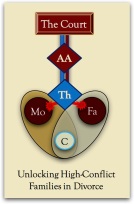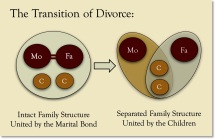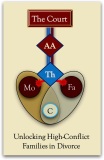I’m up in Oregon today taking my daughter back to college and helping her move into her apartment, and just coincidentally we’re here for the eclipse. Also coincidentally, but I think auspiciously, I am making the third in a series of three announcements.
The first announcement was for The Childress Institute which will be offering Training and Certification in AB-PA.
The second announcement was for the Contingent Visitation Schedule, a Strategic family systems intervention that makes the child’s custody visitation time with the allied narcissistic/(borderline) parent contingent on the child being symptom-free.
Within the structure of the Contingent Visitation Schedule, if the child begins to show elevated symptoms of concern as documented on the Parent-Child Rating Scale, then the child’s custody visitation time with the allied narcissistic/(borderline) will be reduced in order to reduce the pathogenic influence of this parent’s problematic parenting on the child, and the child’s time with the targeted parent will be increased in order to repair the parent-child relationship that is being damaged by the pathogenic parenting of the allied narcissistic/(borderline) parent.
The Contingent Visitation Schedule requires a court order as a structured treatment modality, and it is directed by an Organizing Family Therapist (an AB-PA Certified mental health professional who is trained in AB-PA and in the management of the Contingent Visitation Schedule)
Announcement 3 is the availability of a booklet on Amazon.com that briefly describes a proposal for a pilot program in the family courts to solve high-conflict divorce:
Cumbersome title, but it’s not for you. It’s a support booklet. Fifteen pages of text, short and to the point. Twenty-five pages of appendices – 7 Appendices.
In seven pages this booklet describes the nature of the pathology.
In eight pages this booklet describes a proposal for a pilot program in the family courts of teaming an AB-PA Certified mental health professional with an AB-PA Knowledgeable amicus attorney and inserting this team of high-caliber professional expertise into families evidencing attachment-related pathology surrounding divorce.
The Key Solution
When the Court is presented with a case of attachment-related pathology surrounding divorce, it first orders a Treatment-Focused Assessment Protocol (Appendix 1) from an assessing AB-PA Certified mental health professional.
This structured six- to eight-session Treatment Focused Assessment protocol produces a report to the Court documenting the family’s treatment-related needs with recommendations (Sample Reports; Appendix 2).
If the assessing AB-PA Certified mental health professional finds evidence for the attachment-related family pathology of AB-PA, as documented on the Diagnostic Checklist for Pathogenic Parenting (Appendix 3) and supported by the Parenting Practices Rating Scale (Appendix 4), then the assessing AB-PA Certified mental  health professional will recommend the creation of a Key teaming of a treating AB-PA Certified mental health professional and an AB-PA Knowledgeable amicus attorney.
health professional will recommend the creation of a Key teaming of a treating AB-PA Certified mental health professional and an AB-PA Knowledgeable amicus attorney.
If the assessing AB-PA Certified mental health professional finds that the pathology in the family does not meet symptom criteria for AB-PA, then alternative recommendations will be made based on the treatment-related needs of the family, which may include a recommendation for a six-month Response-to-Intervention (RTI) trial with a Contingent Visitation Schedule to clarify diagnostic considerations and the treatment-related needs of the family.
If the recommendation from the Treatment-Focused Assessment Protocol is for the Court to assemble a Key team of an AB-PA Certified mental health  professional and an AB-PA Knowledgeable amicus attorney, then the Court and the parties will select a new AB-PA Certified mental health professional (not the assessing mental health professional) to be the treating AB-PA Certified mental health professional.
professional and an AB-PA Knowledgeable amicus attorney, then the Court and the parties will select a new AB-PA Certified mental health professional (not the assessing mental health professional) to be the treating AB-PA Certified mental health professional.
If the recommendation from The Treatment-Focused Assessment Protocol is for a 90-day protective separation, then the treating AB-PA Certified mental health professional will treat and recover the child’s healthy development, and will then coordinate the reintroduction of the child’s contact with the psychologically abusive allied narcissistic/(borderline) parent. If practical, the targeted parent and children will begin the 90-day protective separation period with the High Road protocol to restore the children’s normal-range attachment bonding motivations within the first few days of the protective separation period, and the treating AB-PA Certified mental health professional will then provide follow-up recovery stabilization therapeutic support.
If the recommendation from The Treatment-Focused Assessment Protocol is for a six-month Response-to-Intervention trial with the Contingent Visitation Schedule, then the treating AB-PA Certified mental health professional will become the Organizing Family Therapist for the Contingent Visitation Schedule. If the six-month RTI trial with the Contingent Visitation Schedule does not succeed in resolving and stabilizing the family’s pathology, then a 9-month protective separation with a High Road augmented recovery response is warranted, and the treating AB-PA Certified mental health professional becomes the treating family therapist for the family.
During all interventions, either a protective separation period, a Contingent Visitation Schedule, and follow-up recovery stabilization, the narcissistic/(borderline) parent should be court ordered into collateral individual therapy (and possibly conjoint co-parenting therapy) with the treating AB-PA Certified mental health professional.
Working as a team, the AB-PA Certified mental health professional and the AB-PA Knowledgeable amicus attorney will ensure all Court orders necessary for effective treatment.
The Key team of an AB-PA Certified mental health professional and the AB-PA Knowledgeable amicus attorney will continue their active involvement with the family over at least a five-year period (possibly longer, depending on the psychological needs in the family) of stabilizing the family’s ability to make a successful transition to a functional and successful separated family structure of  effective and nurturing co-parenting.
effective and nurturing co-parenting.
All family conflicts regarding co-parenting will be resolved through the mediating treatment-related influence of the AB-PA Certified mental health professional, with legal interface and support from the AB-PA Knowledgeable amicus attorney. The  goal is to foster effective and successful co-parenting and conflict resolution skills, and the family’s successful transition to a relatively healthy separated family structure that does NOT triangulate the child into the spousal conflicts, and that will substantially limit the family’s reliance on litigation as a problem-solving approach.
goal is to foster effective and successful co-parenting and conflict resolution skills, and the family’s successful transition to a relatively healthy separated family structure that does NOT triangulate the child into the spousal conflicts, and that will substantially limit the family’s reliance on litigation as a problem-solving approach.
The Three Pieces of the Solution
Announcement 1 establishes the foundation for creating the AB-PA Certified mental health professionals and AB-PA Knowledgeable amicus attorneys for the Key Solution Pilot Program for the Family Courts.
Announcement 2 provides a potential compromise solution to a protective separation period, the Strategic family systems intervention of the Contingent Visitation Schedule, as a Court-ordered intervention that will be directed by an AB-PA Certified mental health professional.
Announcement 3 is a pilot program proposal for the family law courts that brings all of these component pieces into an organized and replicable framework for successfully resolving all cases of attachment-related pathology surrounding high-conflict divorce.
On October 20th in Houston, Texas, I will be presenting a 4-hour seminar hosted by Children4Tomorrow regarding AB-PA and the Pilot Program Proposal for the Family Courts. The booklet now available on Amazon is a support booklet for the October 20th seminar in Houston.
Appendix 6 of the booklet describes the program evaluation data component of the pilot program, and Appendix 7 provides copies of program Outcome Questionnaires. If the pilot program proposal is accepted in the Houston area family courts, the collaboration of The Childress Institute and Children4Tomorrow will implement the pilot program and will be seeking local university involvement to support program evaluation research and additional research activities as appropriate.
Registration for the October 20th seminar on the Pilot Program Proposal for the Family Courts is being managed by Children4Tomorrow in Houston.
If any legal professionals and court-involved mental health professionals in other geographic jurisdictions are interested in learning more about a comprehensive integrated family law/mental health solution to attachment-related family pathology surrounding high-conflict divorce, a solution that is replicable across the country (and internationally), I would urge you to attend the October 20th seminar in Houston if you possibly can.
The booklet, The Key to Solving High-Conflict Divorce in the Family Courts, is a support booklet for the October 20th seminar, but it will provide a brief overview for the structure of the program, and might be useful in generating interest in other parts of the country (and internationally).
The Childress Institute is currently collaborating with Children4Tomorrow in Houston, Texas. The Childress Institute will also collaborate with any agency in any other jurisdiction in their efforts to bring a Key Solution to High Conflict Divorce pilot program to their family court system. The Key Solution pilot program has a data-driven program evaluation component integrated into the pilot program. Once the pilot program is implemented and its effectiveness is demonstrated, then it is a replicable model for the solution across jurisdictions.
The first step to solving the attachment-related family pathology of “parental alienation” (AB-PA) is to restore an appropriate mental health system response to the pathology from within the required domains of professional expertise. The appropriate mental health system response can then be leveraged to restore an appropriate legal system response of clear and effective action. Working in an effective collaboration, the expertise of professional psychology and the effective support of the legal system can successfully resolve the attachment-related pathology of AB-PA for all children and all families in all cases, everywhere.
That is the goal, and it is now an achievable goal. We just need approval to set up a pilot program within the court system.
Step-by-step.
Craig Childress, Psy.D.
Clinical Psychologist, PSY 18857

Dear Dr. Childress,
I am thrilled for your extensive and exhaustive work to address the complexity of pathological parenting from mental health and legal professional angles. Your strategies to identify, diagnose, and treat the range of actions and and symptoms of this phenomenon are exactly what is needed to diminish the pathological spousal and child abuse affecting suffering families around the world.
I firmly believe that divorce should never occur in an adversarial court system where one parent is labeled a “plaintiff” and the other “defendant.” It is absolutely the wrong construct to effect positive results in a divorce. I advocate instead for a “Divorce Unit,” ideally consisting of three experts (specifically trained) in the fields of mental health, legal, and financial. I believe your concept of training mental health and legal professionals in divorce matters involving children is moving positive divorce in the right direction. I would like you to consider two additional components: 1) moving divorce out of the adversarial court system entirely, and 2) adding a financial expert into the matrix of the “Divorce Unit.” Financial considerations in divorce are equally important in the positive construct of restructuring a family. Money is often a powerful tool driving pathologic behavior. Families squander outrageous financial resources, including their children’s educational funds, vacations, and everyday needs to meet the professional needs of divorce. A financial expert would be able to assist the Divorce Unit with determining realistic financial goals toward a positive divorce.
Please note that I am not opposed to adequate professional compensation for assistance with achieving a positive divorce. However, I have listened to far too many divorce stories that have devastated the family unit with the loss of the primary home, autos, children’s educational funds, to support lengthy, litigious divorce proceedings.
On behalf of all targeted parents and their children, your sustained work provides the hope towards a path forward.
Thank you,
Della Cowall